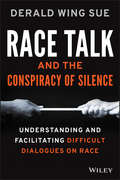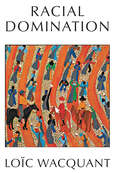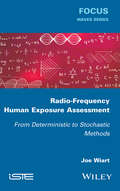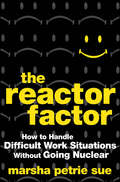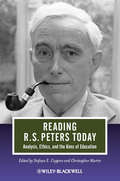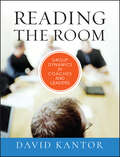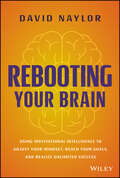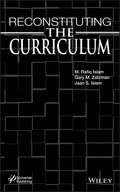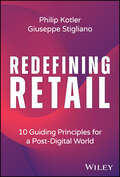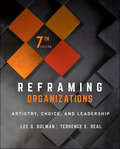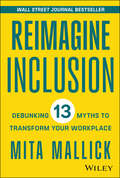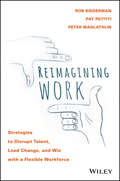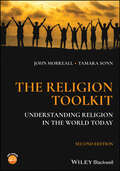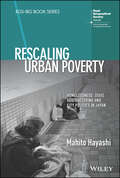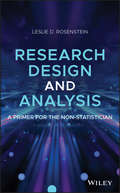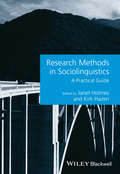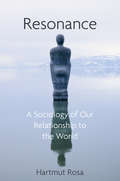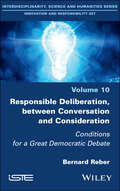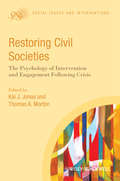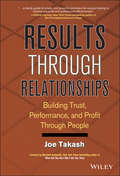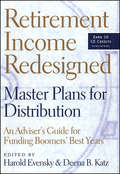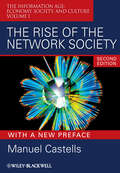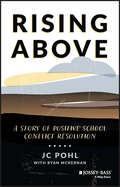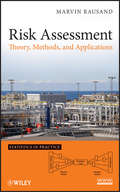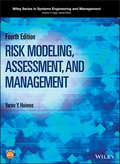- Table View
- List View
Race Talk and the Conspiracy of Silence
by Derald Wing SueLearn to talk about race openly, honestly, and productively Most people avoid discussion of race-related topics because ofthe strong emotions and feelings of discomfort that inevitablyaccompany such conversations. Rather than endure the conflict ofracial realities, many people choose instead to avoid the topicaltogether, or remain silent when it is raised. Race Talk andthe Conspiracy of Silence: Understanding and Facilitating DifficultDialogues on Race puts an end to that dynamic by sharingstrategies for smoothing conversations about race in a productivemanner.A guide for facilitating and participating in difficultdialogues about race, author Derald Wing Sue - aninternationally recognized expert on multiculturalism, diversity,and microaggressions - explores the characteristics,dynamics, and meaning behind discussions about race as well as thehidden "ground rules" that inhibit honest and productive dialogue.Through emotional and visceral examples, this book explains whyconversations revolving around racial issues are so difficult, andprovides guidelines, techniques, and advice for navigating andleading honest and forthright discussions. Readers will develop astronger ability to build rapport with people unlike themselves,and discover how not talking about race impacts society as awhole.Overcome and make visible the fears associated with racetalkLearn practical ideas for talking openly about raceFacilitate and navigate discussion with expert strategyExamine the hidden rules that govern race talkUnderstand the benefits of successful conversationsDiscussions about race do not have to result in disastrousconsequences, and can in fact be highly beneficial to all partiesinvolved. It's important that people have the ability to converseopenly and honestly with their students, colleagues, children, andneighbors, and Race Talk provides the path for achievingthis goal.
Racial Domination
by Loïc WacquantRace is arguably the single most troublesome and volatile concept of the social sciences in the early 21st century. It is invoked to explain all manner of historical phenomena and current issues, from slavery to police brutality to acute poverty, and it is also used as a term of civic denunciation and moral condemnation. In this erudite and incisive book based on a panoramic mining of comparative and historical research from around the globe, Loïc Wacquant pours cold analytical water on this hot topic and infuses it with epistemological clarity, conceptual precision, and empirical breadth.Drawing on Gaston Bachelard, Max Weber, and Pierre Bourdieu, Wacquant first articulates a series of reframings, starting with dislodging the United States from its Archimedean position, in order to capture race-making as a form of symbolic violence. He then forges a set of novel concepts to rethink the nexus of racial classification and stratification: the continuum of ethnicity and race as disguised ethnicity, the diagonal of racialization and the pentad of ethnoracial domination, the checkerboard of violence and the dialectic of salience and consequentiality. This enables him to elaborate a meticulous critique of such fashionable notions as “structural racism” and “racial capitalism” that promise much but deliver little due to their semantic ambiguity and rhetorical malleability—notions that may even hamper the urgent fight against racial inequality.Wacquant turns to deploying this conceptual framework to dissect two formidable institutions of ethnoracial rule in America: Jim Crow and the prison. He draws on ethnographies and historiographies of white domination in the postbellum South to construct a robust analytical concept of Jim Crow as caste terrorism erected in the late 19th century. He unravels the deadly symbiosis between the black hyperghetto and the carceral archipelago that has coproduced and entrenched the material and symbolic marginality of the African-American precariat in the metropolis of the late 20th century. Wacquant concludes with reflections on the politics of knowledge and pointers on the vexed question of the relationship between social epistemology and racial justice.Both sharply focused and wide ranging, synthetic yet controversial, Racial Domination will be of interest to students and scholars of race and ethnicity, power and inequality, and epistemology and theory across the social sciences and humanities.
Radio-Frequency Human Exposure Assessment
by Joe WiartNowadays approximately 6 billion people use a mobile phone and they now take a central position within our daily lives. The 1990s saw a tremendous increase in the use of wireless systems and the democratization of this means of communication. To allow the communication of millions of phones, computers and, more recently, tablets to be connected, millions of access points and base station antennas have been extensively deployed. Small cells and the Internet of Things with the billions of connected objects will reinforce this trend. This growing use of wireless communications has been accompanied by a perception of risk to the public from exposure to radio frequency (RF) electromagnetic field (EMF). To address this concern, biomedical research has been conducted. It has also been important to develop and improve dosimetry methods and protocols that could be used to evaluate EMF exposure and check compliance with health limits. To achieve this, much effort has was made in the 1990s and 2000s. Experimental and numerical methods, including statistical methods, have been developed. This book provides an overview and description of the basic and advanced methods that have been developed for human RF exposure assessment. It covers experimental, numerical, deterministic and stochastic methods.
The Reactor Factor
by Sue Marsha PetrieHow to encourage personal responsibility and eliminate entitlement at work Marsha Petrie Sue, MBA, is a renowned professional speaker who addresses, among other topics, the business value of personal accountability at work. When leaders and workers are held personally responsible for their choices, results improve -- and the entitlement mentality is abolished. In The Reactor Factor, Petrie Sue combines her proven lessons on accountability from interviews with key business leaders to help readers understand how to maximize success and turn negative situations into positive business results, whether a leader or employee. This book shows you how to take charge of your professional future for long-term success. Petrie Sue guides you through the ongoing process of personal development and growth that will guarantee success for your career and organization. Marsha Petrie Sue is also the author of Toxic People: Decontaminate Difficult People Without Using Weapons and Duct Tape Teaches you how to make better decisions to achieve your goals Provides the skills and tactics you need to handle any situation at work Helps you focus on your strengths and remove blame Shows you how to learn from the past to improve your professional future The Reactor Factor is a practical and real-world guide to forging ahead professionally while improving your career, satisfaction, and success.
Reading R. S. Peters Today: Analysis, Ethics, and the Aims of Education (Journal of Philosophy of Education #21)
by Stefaan E. Cuypers Christopher MartinReading R. S. Peters Today: Analysis, Ethics and the Aims of Education reassesses British philosopher Richard Stanley Peters’ educational writings by examining them against the most recent developments in philosophy and practice. Critically reassesses R. S. Peters, a philosopher who had a profound influence on a generation of educationalists Brings clarity to a number of key educational questions Exposes mainstream, orthodox arguments to sympathetic critical scrutiny
Reading the Room
by David KantorPraise for Reading the Room "If you believe, as I do, that tackling our toughest problems in organizations and societies will require significant advances in the human domain of how we think and interact, then you will find this book a wonderful resource for a healthier future. "-Peter Senge, senior lecturer, leadership and sustainability, MIT Sloan School of Management; and founding chair, Society for Organizational Learning (SoL) "A must-read for anyone truly interested in gaining access to and managing their own actions/behavior as well as all those we work with, live with, and interact with. It will shift the way you, others, and the world occur for you. "-Michael C. Jensen, Jesse Isidor Straus Professor of Business Administration, emeritus, Harvard Business School "David Kantor is one of the very few master innovators and theorists in organizational leadership. In this combined story and practice guide, Kantor helps leaders see the hidden dynamics of the groups they lead, and the personal and social factors that shape their relationships with those groups. " -Art Kleiner, editor in chief, strategy+business "Kantor addresses the fundamental issue that leaders are surprisingly inept in conversation and in managing groups. Leaders and managers at all levels should be learning these concepts in order to improve their own ability to analyze what is going on and react appropriately. "-Edgar H. Schein, professor emeritus, MIT Sloan School of Management; and author, Helping: How to Offer, Give, and Receive Help "An exceptional book in the true sense of the word. It stands alone in its grasp of what it takes to succeed as a leader. It's not simply about mastering the five forces, milking cash cows, accelerating experience curves, or even spurring disruptive innovation. It's about reading the room. Leaders who gain mastery of what David Kantor has to teach in this book will achieve true success, not just as leaders, but as people. " -Diana M. Smith, chief executive partner, New Profit Inc. ; and author, The Elephant in the Room: How Relationships Make or Break the Success of Leaders and Organizations "There are only a few wise masters in the world when it comes to any real understanding of leader-ship, and even fewer who share their secrets. David Kantor is one of them, and in Reading the Room we have brilliantly laid out before us both a unique lens and a highly practical method that will change for good the way you lead, and more, the way you think. Not to be missed!" -William Isaacs, author, Dialogue and the Art of Thinking Together; and senior lecturer, MIT Sloan School of Management
Rebooting Your Brain: Using Motivational Intelligence to Adjust Your Mindset, Reach Your Goals, and Realize Unlimited Success
by David NaylorLearn—and teach others—to embrace change and collaboration In Rebooting Your Brain: Using Motivational Intelligence to Adjust Your Mindset, Reach Your Goals, and Realize Unlimited Success, leadership development and sales expert, David Naylor delivers an incisive exploration of why people struggle and how to escape the shackles that hold individuals and organizations back. Leveraging the latest insights of cognitive psychology, neuroscience, and evolutionary biology, the book presents an easy to leverage framework that allows people to understand the exact steps necessary to let go the limiting beliefs and perspectives that create unhappiness, dissatisfaction and mediocrity. Relying on the author’s unique and effective 2logical motivational intelligence-based solutions, readers will discover how to build greater success in both their career and personal life. Readers will also find: Explorations of what holds people back and how to remove those obstacles Strategies for promoting and encouraging accountability, open-mindedness, listening, reflection, engagement, and drive Techniques for reducing or eliminating risk aversion, closed-mindedness, negative attitudes, fear and instant gratification biasAn essential and practical book perfect for team leaders, managers, executives, directors, and other business leaders, Rebooting Your Brain is the evidence- and cognitive science-based resource that leaders everywhere have been waiting for.
Reconstituting the Curriculum
by M. R. Islam Gary M. Zatzman Jaan S. IslamThis inspiring work presents a truly knowledge-based approach to education as an alternative to the current curriculum that is based on consolidating pre-conceived ideas. It demonstrates the advantages of the new curriculum, both in terms of acquiring knowledge and preventing current problems such as technological disasters, global injustice, and environmental destruction. It also shows how it can eliminate plagiarism, low retention in classrooms, non-representative grading, and other common problems. Examples are given from various disciplines, ranging from science and engineering to philosophy and law.
Redefining Retail: 10 Guiding Principles for a Post-Digital World
by Philip Kotler Giuseppe StiglianoDiscover the new realities of working in the post-digital era of consumer brand and retail marketing. In Redefining Retail: 10 Guiding Principles for a Post-Digital World, renowned international marketers Prof. Philip Kotler and Dr. Giuseppe Stigliano deliver a timely and insightful examination of retail and consumer brand marketing. In the book, you’ll find practical and concrete techniques for redefining your organisation’s internal operations and processes, as well as its business strategy. You’ll rethink the entire value chain as you consider the growing importance of sustainability, diversity and inclusion, working policies, and more. The authors describe ten critical principles that should guide the actions of your company, whether you work with a startup, an SME, or a large, established organization. They also discuss: The main challenges retailers face in a world that’s been fundamentally transformed by the digital revolution. How to future-proof your marketing strategy, including 10 guiding principles for a new customer experience at retailers and consumer brands. The opportunities and threats of creating a seamless customer journey in the physical, digital, and virtual realms. Perfect for managers, entrepreneurs, consultants, and investors in both the B2B and B2C sectors, Redefining Retail: 10 Guiding Principles for a Post-Digital World will also prove invaluable to students of management, marketing and business administration, as well as anyone with an interest in the evolution of commerce.
Reframing Organizations: Artistry, Choice, and Leadership
by Lee G. Bolman Terrence E. DealAN ELEGANT FRAMEWORK FOR MORE EFFECTIVE LEADERSHIP Bolman and Deal’s four-frame model has been transforming business leadership for over 40 years. Using a multidisciplinary approach to management, this deceptively simple model offers a powerful set of tools for navigating complexity and turbulence; as the political and economic climate continues to evolve, this model has never been more relevant than today. The Structural Frame explores the convergence of organizational structure and function, and shows why social architecture must take environment into account. Case studies illustrate successful alignment in diverse organizations, and guidelines provide strategic insight for avoiding common pathologies and achieving the right fit. The Human Resource Frame dissects the complex dynamics at the intersection of people and organizations and charts the leadership and human resource practices that build motivation and high performance. The Political Frame shows how competition, conflict, and the struggle for power and resources can be either a tool for growth or a toxic landmine for an individual or organization. Case studies show how both constructive and destructive practices influence social, political, and economic trends both within and beyond organizational boundaries. The Symbolic Frame defines organizational culture, and delves into the emotional and existential underbelly of social life. It underscores the power of symbolic forms such as heroes, myths, and rituals in providing the glue that bonds social collectives together. The Seventh Edition has been updated with new information on cross-sector collaboration, generational differences, virtual environments, globalization, cross-cultural communication, and more, with an expanded Instructor’s Guide that includes summaries, mini-assessments, videos, and extra resources.
Reimagine Inclusion: Debunking 13 Myths To Transform Your Workplace
by Mita MallickReimagining what inclusion can look like in our organizations starts with understanding why these 13 DEI myths are not true—with practical and effective strategies for implementing transformative inclusivity. In Reimagine Inclusion, veteran DEI leader Mita Mallick debunks 13 myths that hold us back from transforming our workplaces. She delivers powerful storytelling combined with practical and hands on ways for us to be more inclusive leaders. She teaches us that when we show up as more inclusive leaders, we have the power to change our organizations, ultimately creating a ripple effect across our ecosystem. You’ll learn: How to understand, confront, and mitigate your own biases as you commit to do the work that starts with yourself. How to coach future leaders and to be intentional about how you lead in your organization—both in public and behind closed doors. To become an active participant in building your workplace’s culture. Reimagine Inclusion walks you through how to: understand the leader’s journey in your organization, interrupt bias at every key decision point, and transform your organization’s systems, processes, and policies to improve inclusivity at every level. This is a must have resource for managers and executives, founders and CEOs. Reimagine Inclusion is for anyone with a stake in building more inclusive, empathetic and resilient organizations, where each and every one of us can thrive.
Reimagining Work: Strategies to Disrupt Talent, Lead Change, and Win with a Flexible Workforce
by Rob Biederman Pat Petitti Peter MaglathlinThrive in the new economy by leading ahead of the next evolution Reimagining Work is the business leader's guide to surviving—and thriving—in the new on-demand economy. As the business and workplace environments evolve, traditional management strategies are becoming obsolete; the skilled workforce demands flexibility and more control over their work—things that the major corporations repeatedly fail to offer. Is it any wonder that the best and brightest talent is increasingly moving toward smaller companies with alternative management structures? Companies like Uber, Lyft, Handy, and Task Rabbit? These businesses have seen major success by attracting the right people—by giving them what they want. As the shift continues, businesses will need to change the way they recruit, develop, and train talent. This book shows you how to restructure and reconfigure your current strategy toward one that will help your business not just survive, but grow stronger in this new environment by offering what top talent demands. Niche spaces like transportation and general labor may have catalyzed the movement toward on-demand, but their influence is spreading and traditional businesses must adapt or die. This book shows you how to turn the shift into an asset for your company by leading through change for the better. Reconsider your current talent sourcing strategies Update your team development and training programs Build a flexible workforce that thrives in the "on-demand" economy Develop your business to succeed amidst the changing business paradigm Growth is more than just expansion; it's also maturation, adaptation, and evolution. Our economy is on the cusp of a seismic shift, and smart businesses will implement change early before the obsolete start falling behind. Reimagining Work gives you actionable guidance for staying ahead of the curve.
The Religion Toolkit: Understanding Religion in the World Today
by Tamara Sonn John MorreallTHE RELIGION TOOLKIT A comprehensive survey of the study of religion worldwide, from ancient indigenous traditions to today’s religious nationalism. “This is an excellent book that is a good, comprehensive overview of the history of religions and the ways of studying religion within Religious Studies… it really brings religions to life for the reader.” —Gavin Flood, Professor of Hindu Studies and Comparative Religion, Oxford University “The authors provide a clear, first-rate introduction to the study of religions, origins, leading scholars and their theories and beliefs…. This is by far the best introductory volume I am aware of both in terms of substance, clarity, and insights.” — John L. Esposito, Distinguished University Professor, Georgetown University, and Past President of the American Academy of Religion The Religion Toolkit: Understanding Religion in the World Today is a clear and comprehensive introduction to the academic study of religions, providing readers an introduction to the history and theories of Religious Studies, a survey of global religious traditions, and an overview of religion in the public sphere today. Discusses theory and methodology in religion, including the disciplines of anthropology, psychology, philosophy, biblical studies, and theologyDescribes the early development of religion, with overviews of traditions around the world, including Judaism, Christianity, Islam, Baha’i, Hinduism, Zoroastrianism, Jainism, Buddhism, Sikhism, Daoism, Confucianism, and ShintoCovers traditions not commonly addressed in introductory textbooks, such as Santeria, Vodou, Tengrism, and indigenous traditions of the AmericasExamines recent developments and contemporary issues such as secularization, bioethics, and the rise of religious nationalismIncludes access to a companion website with discussion questions, additional material, and helpful primary and secondary sources Providing the knowledge and tools required to explore and understand the nature and roles of religion, The Religion Toolkit: Understanding Religion in the World Today, Second Edition is an excellent introductory textbook for undergraduate and graduate courses in Religious Studies, History of Religion, Religions of the World, and Theory and Method in the Study of Religion, as well as a valuable resource for general readers interested in the role of religion in the world today.
Rescaling Urban Poverty: Homelessness, State Restructuring and City Politics in Japan (RGS-IBG Book Series)
by Mahito HayashiRESCALING URBAN POVERTY “In this path-breaking book, Mahito Hayashi explores the rescaled geographies of homelessness that have been produced in contemporary Japanese cities. Through an original synthesis of regulationist political economy and immersive place-based research, Hayashi situates urban homelessness in Japan in comparative-international contexts. The book offers new theoretical perspectives from which to decipher emergent forms of urban marginality and their contestation.” —Neil Brenner, Lucy Flower Professor of Urban Sociology, University of Chicago “Mahito Hayashi traces the shifting spatial strategies of unhoused people as they create spaces of emancipation within Japanese cities. Attending to the complexities of contentious class politics and livelihoods barely sustained by the survival economies, Rescaling Urban Poverty is a unique and valuable contribution to the study of the geographies of urban social movements.” —Nik Theodore, Head of the Department of Urban Planning and Policy, University of Illinois Chicago Rescaling Urban Poverty provides the essential understanding of how state rescaling ensnares homeless and impoverished people in the interplay of the state, domiciled society, public space, urban class relations, social movements, and capitalism. Its three angles—national states, public and private spaces, and urban social movements—uncover the hidden dynamics of rescaling that emerge, and are resisted, at the fringes of mainstream (domiciled) society and its housing regimes/classes. Evidence is drawn from Japanese cities where the author has conducted long-term fieldwork and develops robust urban narratives by mobilising spatial regulation theory, metabolism theory, state theory, and critical housing theory. Rescaling Urban Poverty cross-fertilises these strands through meticulous efforts to reinterpret both old and new texts. By building bridges between classical and contemporary interests, and between the theories and Japanese cities, this book attracts various audiences in geography, sociology, urban studies, and political economy.
Research Design and Analysis: A Primer for the Non-Statistician
by Leslie D. RosensteinA concise, straightforward overview of research design and analysis, helping readers form a general basis for designing and conducting research The practice of designing and analyzing research continues to evolve with advances in technology that enable greater technical analysis of data—strengthening the ability of researchers to study the interventions and relationships of factors and assisting consumers of research to understand and evaluate research reports. Research Design and Analysis is an accessible, wide-ranging overview of how to design, conduct, analyze, interpret, and present research. This book helps those in the sciences conduct their own research without requiring expertise in statistics and related fields and enables informed reading of published research. Requiring no background in statistics, this book reviews the purpose, ethics, and rules of research, explains the fundamentals of research design and validity, and describes how to select and employ appropriate statistical techniques and reporting methods. Readers gain knowledge central to various research scenarios, from sifting through reports of meta-analyses and preparing a research paper for submission to a peer-reviewed journal to discussing, evaluating, and communicating research results. This book: Provides end-to-end guidance on the entire research design and analysis process Teaches readers how to both conduct their own research and evaluate the research of others Offers a clear, concise introduction to fundamental topics ideal for both reference and general education functions Presents information derived from the author’s experience teaching the subject in real-world classroom settings Includes a full array of learning tools including tables, examples, additional resource suggestions, complete references, and appendices that cover statistical analysis software and data sets Research Design and Analysis: A Primer for the Non-Statistician is a valuable source of information for students and trainees in medical and allied health professions, journalism, education, and those interested in reading and comprehending research literature.
Research Methods in Sociolinguistics: A Practical Guide (Guides to Research Methods in Language and Linguistics)
by Janet Holmes Kirk HazenThis single-volume guide equips students of sociolinguistics with a full set of methodological tools including data collection and analysis techniques, explained in clear and accessible terms by leading experts. It features project suggestions, troubleshooting tips, and data assessment across diverse languages. Explores an array of anthropological and scientific methods that cover the full spectrum of contemporary sociolinguistics, from the study of style and discourse analysis to the study of phonetics Details the types of data available, and explains collection methods ranging from sociolinguistic interviews to linguistic landscapes Provides comprehensive coverage of data analysis, subdivided into segments on linguistic and socio-cultural techniques, and linked to numerous languages Includes useful summaries, seasoned advice and troubleshooting tips, ideas for research projects, and a full directory of supplementary reading
Resonance: A Sociology of Our Relationship to the World
by Hartmut RosaThe pace of modern life is undoubtedly speeding up, yet this acceleration does not seem to have made us any happier or more content. If acceleration is the problem, then the solution, argues Hartmut Rosa in this major new work, lies in “resonance.” The quality of a human life cannot be measured simply in terms of resources, options, and moments of happiness; instead, we must consider our relationship to, or resonance with, the world. Applying his theory of resonance to many domains of human activity, Rosa describes the full spectrum of ways in which we establish our relationship to the world, from the act of breathing to the adoption of culturally distinct worldviews. He then turns to the realms of concrete experience and action – family and politics, work and sports, religion and art – in which we as late modern subjects seek out resonance. This task is proving ever more difficult as modernity’s logic of escalation is both cause and consequence of a distorted relationship to the world, at individual and collective levels. As Rosa shows, all the great crises of modern society – the environmental crisis, the crisis of democracy, the psychological crisis – can also be understood and analyzed in terms of resonance and our broken relationship to the world around us. Building on his now classic work on acceleration, Rosa’s new book is a major new contribution to the theory of modernity, showing how our problematic relation to the world is at the crux of some of the most pressing issues we face today. This bold renewal of critical theory for our times will be of great interest to students and scholars across the social sciences and humanities.
Responsible Deliberation, between Conversation and Consideration: Conditions for a Great Democratic Debate
by Bernard ReberCommunication is a crucial issue in our complex societies tinted by distrust. It is the core of democratic life and almost all human and social actions. Therefore it is essential for communication to be responsible. But responsible communication cannot only be conceived as a deontological issue, framed by ethical compliance requirements or good practices promotion. It should be considered with all the virtualities of communication, from conversation to consideration, going through narrative, interpretation and argumentation. Indeed each of these communicational capacities has its properties, assets, complementarities and limitations. They constitute different ways to be responsive. This book offers a contribution to the debate of Theory of Deliberative Theory (TDD), reexamined here within its different inspiration sources, notably the opposition between communicational turn and system, the fact of moral pluralism and the public reason.
Restoring Civil Societies: The Psychology of Intervention and Engagement Following Crisis (Contemporary Social Issues #11)
by Kai J. Jonas Thomas A. MortonBreakdowns in civil societies can be catalyzed by factors ranging from war and genocide to natural disaster, disease and economic downturns. Restoring Civil Societies examines social processes related to civic engagement in the wake of these societal ruptures. The authors show how crises in civil society can be both pervasive and localized, broad-based and limited to defined social sub-groups. Whatever their scale, Restoring Civil Societies identifies models that analyze the social psychology of crises in order to devise ways of re-activating civic engagement and safeguarding civil society. Focusing on these positive interventions, the authors identify a number of key strategies, ranging from the simplicity and directness of bystander interventions to the volunteer armies mobilized in the wake of natural disasters. They include collective action organized to redress systemic inequalities, and the vital healing role played by truth commissions in Rwanda and elsewhere. Restoring Civil Societies fills the gap between basic research on social issues and translation into social policies and programs-an area which, in light of current economic and social unrest, is more important now than ever.
Results Through Relationships
by Joe TakashA career guide to more significant business results in a shorter period of timeResults Through Relationships shows professionals how to establish break-through relationships with new prospects and their existing networks, including colleagues, bosses, customers, clients, vendors, and others. Many people assume that only new contacts will help them achieve their goals, but in reality, many breakthroughs happen within existing networks. This handy career guide focuses on the bottom-line behaviors that expedite trust, improve workplace performance, and increase profit. Author Joe Takash presents a nine-step process that anyone can master, and his formula proves that we're all in the relationship business first.
Retirement Income Redesigned: Master Plans for Distribution -- An Adviser's Guide for Funding Boomers' Best Years
by Harold Evensky Katz Deena B. Walter UpdegraveClients nearing retirement have some significant challenges to face. And so do their advisers. They can expect to live far longer after they retire. And the problems they expect their advisers to solve are far more complex. The traditional sources of retirement income may be shriveling, but boomers don't intend to downsize their plans. Instead, they're redefining what it means to be retired--as well as what they require of financial advisers. Planners who aren't prepared will be left behind. Those who are will step up to some lucrative and challenging work. To help get the work done, Harold Evensky and Deena Katz--both veteran problem solvers--have tapped the talents of a range of experts whose breakthrough thinking offers solutions to even the thorniest issues in retirement-income planning: Sustainable withdrawals Longevity risk Eliminating luck as a factor in planning Immediate annuities, reverse mortgages, and viatical and life settlements Strategies for increasing retirement cash flow In Retirement Income Redesigned, the most-respected names in the industry discuss these issues and a range of others.
The Rise of the Network Society: The Information Age: Economy, Society And Culture, Volume I (Information Age Series #12)
by Manuel CastellsThis first book in Castells' groundbreaking trilogy, with a substantial new preface, highlights the economic and social dynamics of the information age and shows how the network society has now fully risen on a global scale. Groundbreaking volume on the impact of the age of information on all aspects of society Includes coverage of the influence of the internet and the net-economy Describes the accelerating pace of innovation and social transformation Based on research in the USA, Asia, Latin America, and Europe
Rising Above: A Story of Positive School Conflict Resolution
by J. C. Pohl Ryan McKernanTransform your school’s culture for the better In Rising Above, we meet Serenity Springs High School’s new school counselor Monica Sheppard as she is fielding a barrage of school conflict issues coming at her from what seems like every direction. Backed by a team of veteran school culture experts from different facets of education, author JC Pohl delivers an engaging, ripped-from-the-headlines narrative about a fictional school community devolving into chaos. With social media running out of control, teachers feeling burnt out, and a principal that has simply lost her way, Monica immerses herself into the school community and strives to bridge many of the divides that define contemporary school environments across the United States. The book includes insights from real-world experts, including Principal Dr. Pete Getz, relationship expert Emil Harker, LMFT, and school counselor educator Dr. Stephanie Eberts. It also offers: A comprehensive set of strategies and tools to help cure the ailments destroying school culture Insightful discussions of teacher-student, teacher-teacher, teacher-administration, teacher-parent, teacher-staff, and student-student conflict management and resolution A compelling narrative of a school leader rising above the chaos that surrounds her and showing readers a tangible pathway that leads to positive school conflict resolutionAn engrossing and essential read for principals, assistant principals, school counselors, and other district administrators, Rising Above also proves invaluable to K-12 teachers and higher education professors with an interest in building exemplary school cultures.
Risk Assessment
by Marvin RausandAn introduction to risk assessment that utilizes key theory and state-of-the-art applications With its balanced coverage of theory and applications along with standards and regulations, Risk Assessment: Theory, Methods, and Applications serves as a comprehensive introduction to the topic. The book serves as a practical guide to current risk analysis and risk assessment, emphasizing the possibility of sudden, major accidents across various areas of practice from machinery and manufacturing processes to nuclear power plants and transportation systems.The author applies a uniform framework to the discussion of each method, setting forth clear objectives and descriptions, while also shedding light on applications, essential resources, and advantages and disadvantages. Following an introduction that provides an overview of risk assessment, the book is organized into two sections that outline key theory, methods, and applications.Introduction to Risk Assessment defines key concepts and details the steps of a thorough risk assessment along with the necessary quantitative risk measures. Chapters outline the overall risk assessment process, and a discussion of accident models and accident causation offers readers new insights into how and why accidents occur to help them make better assessments.Risk Assessment Methods and Applications carefully describes the most relevant methods for risk assessment, including preliminary hazard analysis, HAZOP, fault tree analysis, and event tree analysis. Here, each method is accompanied by a self-contained description as well as workflow diagrams and worksheets that illustrate the use of discussed techniques. Important problem areas in risk assessment, such as barriers and barrier analysis, human errors, and human reliability, are discussed along with uncertainty and sensitivity analysis.Each chapter concludes with a listing of resources for further study of the topic, and detailed appendices outline main results from probability and statistics, related formulas, and a listing of key terms used in risk assessment. A related website features problems that allow readers to test their comprehension of the presented material and supplemental slides to facilitate the learning process.Risk Assessment is an excellent book for courses on risk analysis and risk assessment at the upper-undergraduate and graduate levels. It also serves as a valuable reference for engineers, researchers, consultants, and practitioners who use risk assessment techniques in their everyday work.
Risk Modeling, Assessment, and Management
by Yacov Y. HaimesExamines timely multidisciplinary applications, problems, and case histories in risk modeling, assessment, and managementRisk Modeling, Assessment, and Management, Third Edition describes the state of the art of risk analysis, a rapidly growing field with important applications in engineering, science, manufacturing, business, homeland security, management, and public policy. Unlike any other text on the subject, this definitive work applies the art and science of risk analysis to current and emergent engineering and socioeconomic problems. It clearly demonstrates how to quantify risk and construct probabilities for real-world decision-making problems, including a host of institutional, organizational, and political issues.Avoiding higher mathematics whenever possible, this important new edition presents basic concepts as well as advanced material. It incorporates numerous examples and case studies to illustrate the analytical methods under discussion and features restructured and updated chapters, as well as:A new chapter applying systems-driven and risk-based analysis to a variety of Homeland Security issuesAn accompanying FTP site--developed with Professor Joost Santos--that offers 150 example problems with an Instructor's Solution Manual and case studies from a variety of journalsCase studies on the 9/11 attack and Hurricane KatrinaAn adaptive multiplayer Hierarchical Holographic Modeling (HHM) game added to Chapter ThreeThis is an indispensable resource for academic, industry, and government professionals in such diverse areas as homeland and cyber security, healthcare, the environment, physical infrastructure systems, engineering, business, and more. It is also a valuable textbook for both undergraduate and graduate students in systems engineering and systems management courses with a focus on our uncertain world.
